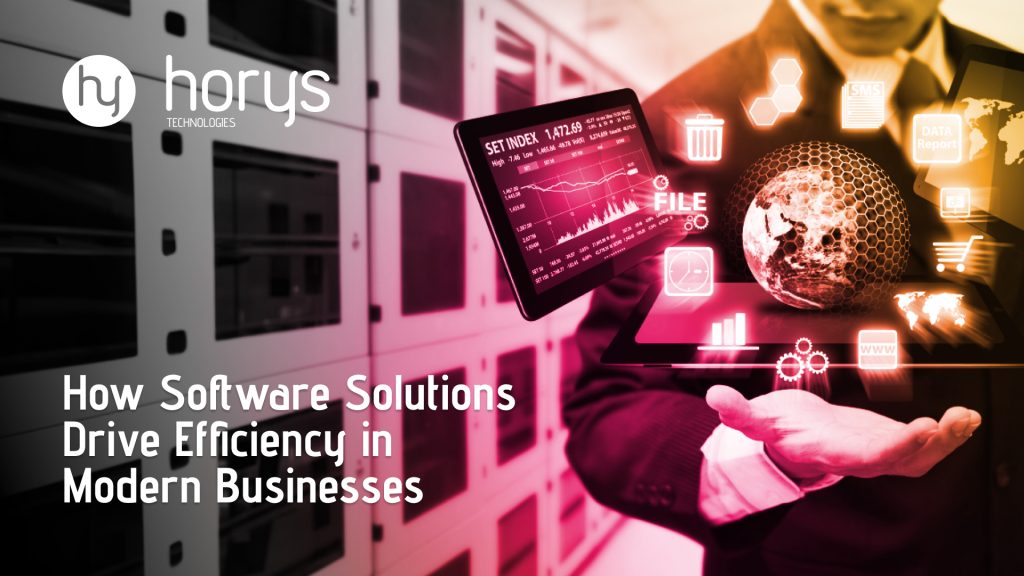Efficiency is the lifeblood of modern businesses, enabling organizations to stay competitive in an ever-evolving marketplace. As businesses navigate complex challenges such as globalization, digital transformation, and rising customer expectations, software solutions are becoming indispensable. By automating workflows, streamlining operations, and enhancing decision-making, software has redefined how businesses operate, enabling them to achieve more with fewer resources. This article provides a comprehensive examination of how software solutions drive efficiency in modern businesses, with detailed examples of tools and their transformative impact across key areas.
In a world where time and resources are critical, efficiency ensures survival and growth. Businesses that optimize processes and embrace cutting-edge technologies not only reduce operational costs but also improve customer satisfaction, enhance employee productivity, and unlock opportunities for innovation.
How Software Solutions Drive Efficiency: Why Efficiency Matters in Business
- Cost Savings: Streamlined operations eliminate waste, saving time and money.
- Increased Productivity: Automation reduces manual effort, enabling employees to focus on high-value tasks.
- Competitive Advantage: Businesses that adapt faster to market changes gain a significant edge.
- Customer Satisfaction: Faster delivery of services and products improves client loyalty.
How Software Plays a Role
Software acts as a catalyst for efficiency by automating mundane tasks, centralizing operations, and providing actionable insights through data analytics. From small startups to multinational corporations, businesses of all sizes rely on software to stay agile and productive.
1. How Software Solutions Drive Efficiency: Streamlining Operations with Automation
Automation is transforming businesses by eliminating repetitive tasks and ensuring consistent execution. Robotic Process Automation (RPA) and AI-driven tools are at the forefront of this revolution.
Key Tools and Technologies:
- Robotic Process Automation (RPA):
Platforms like UiPath, Automation Anywhere, and Blue Prism handle repetitive processes such as data entry, invoice processing, and report generation. - AI-Powered Workflow Automation:
Tools like Zapier and Integromat connect disparate applications, automating workflows by triggering actions based on predefined events. - Process Mining Software:
Solutions like Celonis identify inefficiencies in workflows, recommending optimized processes based on real-time data.
Real-World Impact:
- In Banking: Automation reduces loan processing times from weeks to hours.
- In Retail: Inventory restocking and pricing updates are managed in real-time.
Automation not only improves efficiency but also frees up human resources for strategic, creative, and customer-facing tasks.
2. Enhancing Collaboration and Communication
The shift towards remote and hybrid work models has amplified the importance of seamless communication and collaboration. Modern software platforms enable teams to work together, regardless of location.
Key Software Solutions:
- Real-Time Collaboration Platforms:
Tools like Slack and Microsoft Teams integrate chat, video conferencing, and file sharing, centralizing team communication. - Project Management Software:
Platforms such as Asana, Trello, and Monday.com organize tasks, assign responsibilities, and track progress, ensuring projects stay on schedule. - Video Conferencing Tools:
Software like Zoom, Google Meet, and Cisco Webex support virtual meetings, connecting global teams effortlessly.
Impact on Efficiency:
- Reduced Miscommunication: Centralized platforms ensure everyone accesses the same information.
- Improved Accountability: Task tracking tools assign clear roles and deadlines.
- Faster Decision-Making: Real-time updates enable quicker resolutions.
3. Improving Customer Relationship Management (CRM)
Customer-centricity is a key differentiator in today’s market. CRM software streamlines customer interactions, providing valuable insights and improving service delivery.
Top CRM Features:
- Omnichannel Engagement:
CRMs like Zendesk and HubSpot ensure seamless communication across email, chat, social media, and phone channels. - Predictive Analytics:
AI-powered platforms like Salesforce Einstein forecast customer needs, enabling businesses to act proactively. - Personalized Customer Journeys:
Tools like Zoho CRM use data to create tailored experiences for each customer.
Examples of Impact:
- E-Commerce Businesses: Personalization engines recommend products, boosting sales.
- Healthcare Providers: Appointment reminders and follow-ups are automated, improving patient care.
CRM software ensures that businesses retain loyal customers while attracting new ones through superior service.
4. Optimizing Supply Chain and Inventory Management
Efficient supply chain management is crucial for minimizing costs and ensuring timely delivery. Software solutions optimize every step, from procurement to last-mile delivery.
Key Innovations:
- Real-Time Tracking:
Platforms like SAP SCM and Oracle NetSuite provide end-to-end visibility into the supply chain. - Demand Forecasting Tools:
Solutions such as RELEX analyze historical data to predict inventory requirements. - Blockchain for Supply Chain Transparency:
Platforms like VeChain track products’ origins and movements, preventing counterfeiting and ensuring ethical sourcing.
Case Study:
- Retail Industry: Automated restocking systems ensure shelves are never empty, avoiding lost sales.
- Logistics Companies: Real-time route optimization software reduces delivery times and fuel costs.
Supply chain software reduces delays, lowers costs, and ensures customer satisfaction through consistent product availability.
5. Revolutionizing Financial and Accounting Processes
Managing finances efficiently is crucial for business success. Financial software automates complex processes, ensuring accuracy and compliance.
Top Financial Tools:
- Billing and Invoicing Software:
Tools like QuickBooks and FreshBooks generate invoices, track payments, and manage taxes. - Expense Management Platforms:
Solutions like Expensify automate the approval process for employee expenses. - Budgeting and Forecasting Tools:
Software like Anaplan and Adaptive Insights helps businesses plan for future growth by analyzing financial trends.
Benefits:
- Increased Accuracy: Reduces errors in bookkeeping and compliance reporting.
Time Savings: Automation speeds up month-end closing, and payroll processing.
6. Advancing Human Resources and Workforce Management
Managing a workforce effectively is a cornerstone of operational success. HR software simplifies recruitment, training, and employee performance management.
Key Software Features:
- Recruitment and Onboarding:
Platforms like Greenhouse and Workday streamline hiring processes and onboarding workflows. - Employee Engagement Tools:
Solutions such as 15Five and Culture Amp collect feedback and measure employee satisfaction. - Payroll Automation:
Tools like Gusto calculate wages, handle deductions, and ensure compliance with labor laws.
Impact:
Efficient HR management ensures happier employees, reduces turnover rates, and saves administrative costs.
7. Leveraging Data Analytics for Decision-Making
Data is the new oil, and analytics tools refine it into actionable insights. Businesses that embrace analytics make faster, smarter decisions.
Popular Analytics Tools:
- Business Intelligence (BI):
Platforms like Tableau and Power BI create visual dashboards for decision-makers. - Predictive Analytics:
Software like IBM Watson Analytics predicts future outcomes based on historical trends. - Customer Insights:
Tools like Google Analytics provide detailed customer behavior reports for marketing optimization.
Benefits:
- Improved decision-making reduces waste and uncovers growth opportunities.
- Predictive analytics helps businesses anticipate market trends and customer demands.
8. Enhancing Cybersecurity and Risk Management
Cybersecurity software protects businesses from the growing threat of data breaches and cyberattacks, ensuring business continuity.
Key Cybersecurity Tools:
- AI-Powered Threat Detection:
Solutions like CrowdStrike and Darktrace proactively identify vulnerabilities and neutralize risks. - Data Encryption Software:
Tools like VeraCrypt secure sensitive information from unauthorized access. - Compliance Management:
Platforms such as OneTrust help businesses adhere to data protection regulations like GDPR and CCPA.
Impact:
Cybersecurity solutions safeguard sensitive information, build customer trust, and reduce costly downtime.
Challenges in Adopting Software Solutions
Despite the benefits, businesses face obstacles when implementing new technologies:
- Cost: Initial investments in software and training can be significant.
- Resistance to Change: Employees may be reluctant to adopt new workflows.
- Integration Issues: Legacy systems may struggle to connect with modern software.
Overcoming Challenges:
Providing training, demonstrating ROI, and choosing scalable solutions ensure successful adoption.
Future Trends in Business Software
The future of software promises even greater efficiency through advancements such as:
- AI-Powered Software Development: Tools like GitHub Copilot simplify coding and debugging.
- Quantum Computing: Offers unparalleled computational power for complex problem-solving.
- Sustainability-Focused Software: Tools for tracking carbon footprints and promoting eco-friendly practices will gain prominence.
Conclusion: How Software Solutions Drive Efficiency
Software solutions are revolutionizing modern businesses by driving efficiency, reducing costs, and enabling innovation. From automating workflows to improving customer engagement, their impact is profound. As technology continues to evolve, businesses that embrace cutting-edge software will remain at the forefront of their industries.
About Horys
A premier hardware and software solutions company, Horys’ technology is on par with global standards. Its offerings include a variety of hardware products like smartphones, tablets, and computers. And software products include server hosting and management solutions.
Disclaimer: This article combines insights from both human expertise and AI technology to provide informational content. It is for informational purposes only and should not be interpreted as financial advice or a recommendation to invest. Virtual asset investments are inherently volatile and risky. Horys provides no guarantee of accuracy or completeness for the information herein. Independent research and professional advice are recommended before engaging in any investment activity. Horys bears no liability for investment decisions based on this article.



